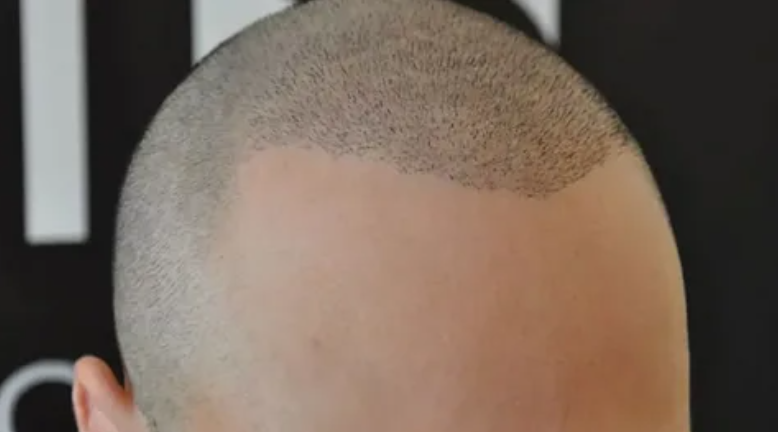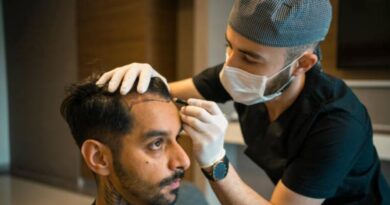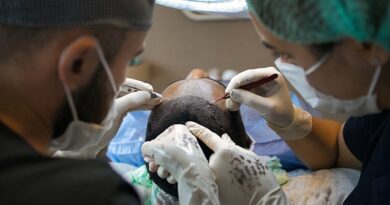15 Frequently Asked Questions About Successful Hair Transplantation in Turkey
Is it OK to Use Smoking or Nicotine Products Before Hair Transplantation?
Yes, smoking or using nicotine products before the hair transplant can damage the hair transplant and adversely affect the healing process. Smoking and nicotine can affect blood circulation in hair transplantation and prevent the nutrition of hair follicles. As a result, the adhesion rate of the grafts used during the transplantation hair process may decrease and may spoil the natural appearance of your hair. Also, smoking and nicotine can slow the healing process and increase the risk of infection. Avoiding smoking or using nicotine products before hair transplantation can help the process to be completed successfully and a speedy recovery process.
Is it OK for me to eat or drink alcohol or alcoholic beverages before having a hair transplant?
Consuming alcohol or alcoholic beverages before hair transplantation has no direct effect on the transplantation hair process. However, alcohol consumption may adversely affect the healing process after hair transplantation.
Alcohol dilates blood vessels and reduces blood clotting. This may increase bleeding after transplantation hair and slow down the healing process. In addition, alcohol can prevent you from getting enough fluid after transplantation hair by increasing the loss of fluid in the body. After hair transplantation, the body should focus on the healing process. Therefore, it is recommended to avoid alcohol consumption for a few days after transplantation hair. In addition, increasing fluid intake after hair transplantation can help speed up the healing process.
How to Care After Hair Transplantation?
Correct care procedures after hair transplantation are extremely important to accelerate the healing process and maximize success after hair transplantation. Here are the care steps after hair transplantation:
Do not wash your hair for the first few days: It is recommended not to wash your hair for the first few days after transplantation hair. This will help the hair follicles settle and heal safely.
Wash your hair correctly: When you start washing your hair after hair transplantation, make sure that the water is warm or cold. Hot water can damage hair follicles. Wash your hair gently and do not rub it hard to avoid damaging your scalp.
Take your antibiotics regularly: Taking the antibiotics given to you regularly after hair transplantation helps to reduce the risk of infection.
Dry your hair gently: Use a towel to dry your hair after hair transplantation, but dry it gently. Do not rub your hair dry, instead, gently towel dry it.
Avoid direct sunlight: Avoid direct sunlight after hair transplantation.
Comb your hair: Gently combing your hair after hair transplantation will prevent hair follicles from coming out. When combing your hair, use a soft comb and comb your hair gently.
Stay in touch with your doctor during the recovery process: Stay in touch with your doctor during the recovery period after hair transplantation and report any concerns or problems.
As a result, applying the right care procedures after hair transplantation will accelerate the healing process and help maximize the success after hair transplantation.
Why should I have a hair transplant in Turkey?
Turkey is one of the leading countries in the world for hair transplantation and therefore many people prefer Turkey for hair transplantation. Here are some reasons to have a hair transplant in Turkey:
Affordable cost: Turkey offers more cost-effective options for hair transplantation than other countries. Hair transplant prices can be much more economical than other countries.
High quality service: Turkey has a worldwide reputation for hair transplantation. Many people who have had a hair transplant in Turkey state that they receive high quality service and the results are excellent.
Experienced and Qualified Doctors: Doctors performing hair transplants in Turkey are experienced and qualified in this field. Many doctors serve patients from all over the world. Therefore, having a hair transplant in Turkey guarantees that the procedure is performed by qualified doctors.
Advanced medical equipment: Turkey has highly advanced medical equipment and uses the latest technologies for hair transplantation. This ensures that the process is completed in less time and results are better.
Tourism opportunities: Turkey is a country famous for its world-famous tourist sites, historical sites and rich culture. For this reason, many people who have a hair transplant in Turkey stay in Turkey for a vacation after the procedure.
As a result, Turkey has gained a worldwide reputation for hair transplantation and offers many advantages for hair transplantation. Cost-effective options, high-quality service, experienced doctors, advanced medical equipment and tourism facilities make Turkey an ideal option for hair transplantation.
Are There Any Things To Do Before Having Hair Transplantation?
There are some things to do before having a hair transplant. Making some preparations before the procedure can help improve results. Here are the things to do before having a hair transplant:
Meeting with the doctor: It is important to have an interview with the doctor before having a hair transplant. In this meeting, you can get information about the procedure and find out if the doctor is a suitable candidate for you.
Quitting smoking and alcohol use: Smoking and alcohol use may slow down the recovery after hair transplantation and adversely affect the results. For this reason, it would be beneficial to quit smoking and alcohol use at least 1-2 weeks before the hair transplant procedure.
Discontinuation of drugs: Some drugs may cause bleeding after hair transplantation. Therefore, at least 1-2 weeks before hair transplantation, the use of drugs that increase the risk of bleeding, such as aspirin or blood thinners, should be discontinued. However, do not stop the medications your doctor recommends and consult your doctor before the procedure.
Haircut: During the hair transplantation process, the hair should be cut from region to region. Therefore, your hair may need to be shortened before the procedure.
Hair care: Paying attention to hair care before hair transplantation can facilitate post-procedure recovery. Keep your hair clean and moist, massage your scalp regularly, and avoid tangles.
Post-procedure planning: The recovery period after hair transplantation can vary from a few days to a few weeks. By making post-process planning, you can get post-process permission and make the necessary preparations.
As a result, making a series of preparations before hair transplantation can help improve results. Interviewing with the doctor, quitting smoking and alcohol use, stopping medications, haircut, hair care and post-procedure planning are the main ones of these preparations.
What are the Benefits of Hair Transplantation?
Hair transplantation is a procedure that helps people with hair loss to regain their hair. Hair transplantation has many benefits:
Hair loss prevention: Hair transplantation can help prevent hair loss. Hair follicles transplanted are healthy hair follicles that are not affected by hair loss. Therefore, hair transplantation can help prevent hair loss and slow down hair loss.
Increasing hair density: Hair transplantation can help increase hair density. New hair follicles are placed in the hair transplant area and this causes an increase in hair density.
Natural look: The hair transplant process can make the hair look natural. The transplanted hair follicles look like the hair of the person experiencing hair loss. Therefore, hair regains a natural appearance after hair transplantation.
Increase self-confidence: Hair loss affects the self-confidence of many people. Hair transplantation can help increase self-confidence along with regrowth of hair.
Younger appearance: Hair loss can make people look older. Hair transplantation can help the person to have a more youthful and energetic appearance by regaining the hair.
Facilitating care: After hair transplantation, hair becomes easier to care for. The increase in the density of the hair makes it easier to style and comb the hair.
In conclusion, the hair transplant procedure has many benefits. Preventing hair loss, increasing hair density, providing a natural appearance, increasing self-confidence, providing a younger appearance and facilitating hair care are among the main benefits of hair transplantation.
Which Blood Tests Are Performed Before Hair Transplant Surgery?
Before hair transplant surgery, a series of blood tests are usually done. These tests help to evaluate the health status of the person before the hair transplant procedure. Which blood tests to do is decided by your doctor. But usually the following blood tests are done:
Complete blood count (CBC): This test measures the number and size of blood cells (red blood cells, white blood cells, and platelets). Performing a CBC test before hair transplant surgery can help detect problems such as infections or anemia in the person’s blood.
Blood sugar test: A blood sugar test measures the level of blood sugar. This test can help detect problems with blood sugar, such as diabetes.
Blood coagulation test: This test measures how quickly the blood clots. Before hair transplant surgery, a blood coagulation test can help reduce the risk of bleeding during surgery by allowing the blood to clot normally.
Hepatitis B and C testing: These tests measure antibodies or antigens for the hepatitis B and C viruses. Testing for hepatitis B and C before hair transplant surgery can help reduce the risk of infection.
HIV test: This test helps detect HIV infection. HIV testing before hair transplant surgery can help reduce the risk of infection.
Blood group test: This test helps determine the blood group. This test is done to provide appropriate blood when blood transfusion is required during the hair transplant procedure.
Your doctor will determine the blood tests to be done before the hair transplant surgery. The results of these tests will help evaluate your pre-operative health.
Can Curly Hair Transplant Be Done?
Transplantation hair can also be performed on people with curly hair. However, before hair transplantation, it should be evaluated whether the person is a suitable candidate for hair transplantation, taking into account the factors such as the structure of the hair and the reason for hair loss. Curly hair is a bit more challenging than other hair types. The reason for this is the characteristics of curly hair arising from its natural structure. Curly hair strands are thicker, have more curl and have less flexibility. Therefore, hair transplantation on curly hair requires a more delicate procedure.
During transplantation hair surgery, hair transplantation can be performed with appropriate angles and depths for people with curly hair, in accordance with the natural structure of the hair strands. After hair transplantation, it is important to care for curly hair in accordance with its natural structure. In summary, hair transplantation can be performed on people with curly hair, but considering factors such as the structure of the hair and the reason for hair loss, it should be evaluated whether the person is a suitable candidate for hair transplantation.
Is Hair Transplant Permanent?
Transplantation hair is a permanent solution. Since hair transplantation is performed using real hair strands, it acts like natural hair and gives permanent results. The hair in the transplanted areas continues to grow naturally for many years. During hair transplantation, hair follicles are usually taken from the nape area and transplanted to areas where there is no hair loss. In this way, the hair continues to grow naturally, even if there is some thinning in the area where the roots are taken. After transplantation hair, it may take several months for the hair to fully grow. However, after the hair has grown, they continue to grow naturally for many years. After hair transplantation, the person should be careful about hair care and hair health. In order for the hair to grow in a healthy way, it is important to take care of the hair regularly and take care of the health of the hair.
Is Swimming in the Pool or Sea Safe for Me?
After transplantation hair, swimming in the pool or sea may not be recommended for a while. Because water may contain microbes that may adversely affect tissue healing after hair transplantation. In addition, the pressure of the water during swimming may damage the tissue in the hair transplant area or the newly transplanted hair may be damaged. Therefore, before swimming after hair transplantation, you should carefully follow your doctor’s instructions.
Generally, it is recommended not to enter the pool, sea or sauna for about 2 months after the hair transplant procedure. During this time, it helps to heal the wounds in the hair transplant area and fix the newly transplanted hair follicles in place. It is also important to protect the hair transplant area from sun and dust during this time.
Before swimming after transplantation hair, it is important to talk to your doctor and follow their instructions carefully and to protect the hair transplantation area during the healing process. If your doctor does not approve of swimming, it is recommended that you avoid swimming activities until recovery is complete.
How Long Should I Wait Before Cutting or Shaving My Hair After a Hair Transplant?
After transplantation hair, it may be necessary to wait for a certain period of time for the hair to be cut or shaved. This period may vary depending on the hair transplant method and the person’s recovery process. In transplantation hair performed with the FUE method, it is usually possible to cut or shave the hair short after the procedure, since the hair in the area must be cut short while the transplanted hair follicles are removed. However, cutting or shaving the hair short after a hair transplant can affect the healing process and should not be done, especially during the first few weeks.
In hair transplantation with the FUT method, since a strip is taken from the scalp, the procedure can be performed without cutting the hair short. However, during the first few weeks, the hair should not be touched and the hair transplant area should not be damaged. During the healing process, it is important to protect the hair transplant area and reduce the risk of infection. Therefore, it is important that you follow your doctor’s recommendations and instructions. It is recommended that you talk to your doctor about cutting or shaving hair after transplantation hair and get his approval.
Is It Possible to Dye My Hair After Hair Transplant?
After hair transplantation, you need to be careful about dyeing your hair. Coloring hair immediately after hair transplantation can damage the roots of newly transplanted hair and delay the healing process. In addition, the color of your hair may change after transplantation hair, so depending on how rooted the transplanted hair is, undesirable results may occur as a result of hair dyeing. Generally, it is recommended not to dye your hair for about 4-6 months after transplantation hair. During this time, it helps to heal the wounds in the hair transplant area and fix the newly transplanted hair in place. However, this period may vary from person to person and hair transplant method, so it is important to consider your doctor’s recommendations.
Is İt True That the Hair From the Donor Area Grows Back?
Most of the hair taken from the donor area in hair transplantation is permanent and grows back over time. Hair transplantation involves taking hair follicles from the donor area and placing them in areas with baldness or sparse hair loss. The hair taken from the donor area is usually the hair in the nape area and has the characteristics of being genetically permanent. Therefore, after hair transplantation, the hair follicles in the donor area can grow back and return to the natural appearance of the hair.
However, the number and density of hair taken from the donor area during transplantation hair is limited. For this reason, the surgeon performing the procedure should carefully plan the number of hairs to be taken from the donor area and where they will be taken. Also, the hair in the donor area after hair transplantation may not be fully recovered or replaced with new hair growth. Therefore, it is important to evaluate factors such as the density and quality of the hair in your donor area before the hair transplant procedure.
When will the transplanted area heal after the transplant?
The healing process after hair transplantation may vary from person to person and according to the techniques used. However, in the first few days after hair transplantation, redness, crusting and slight swelling can be seen in the transplanted area.
These symptoms subside within a few days and the healing process accelerates over the next few days. It takes about 2-3 weeks until the healing process is complete. During this period, there may be some crusts and flaking in the scalp area. This is a natural process and the crusts usually fall off on their own within a few weeks. After hair transplantation, it is necessary to avoid hot, humid environments for the first few weeks in the transplanted area. This is important to prevent sweating and reduce the risk of infection. It is also recommended to avoid exercise and heavy lifting for a few days after the hair transplant procedure.
The full recovery time may vary depending on the hair transplant procedure, and the person’s lifestyle, diet and other factors may also affect this process. Generally, the full recovery period can vary between 6 and 12 months, and during this time, time is needed for the hair in the scalp area to regain its natural appearance.
What Should I Do to Get a Price or Consulting Service?
You can go to askmedicals.com to get a price or consultancy service. You can reach us 24/7 via the contact information on the site. In addition, if you want to learn more about the transplantation hair process, you can review the informative content on the site. In these contents, you can find information about what to consider before and after transplantation hair, hair transplantation techniques, prices and many more.
Remember, transplantation hair is a personalized process and it may be helpful to consult with an expert consultant to determine the most suitable options to meet your needs. As Askmedicals team, we are always at your service to reach the most suitable hair transplant solution for you.
You can benefit from the privileges by contacting us.
- Best price guarantee
- You will not encounter hidden payments.
- Free transfer to airport, hotel or clinic
- Accommodation is included in the package prices.





Pingback: Which is Better FUE or FUT Transplantation? - AskMedicals